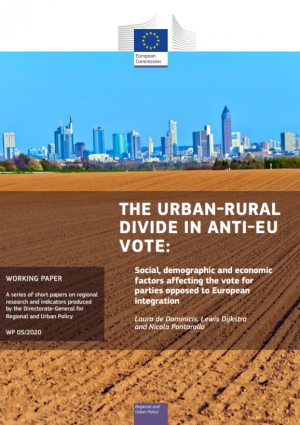
In recent years, protest voting, voting for populist parties and, specifically for Europe, votes for parties opposed to European integration, have increased substantially. While most of the existing research looked at voters’ characteristics, a new paper published by European Commission's Directorate General for Urban and Regional Policies (DG REGIO) focuses instead on the urban-rural divide.
The paper tries to explain why cities – and urban areas in general - in Europe tend to vote less for Eurosceptic parties. It also shows that three factors are associated to a higher anti-EU vote in all areas:
- growth in unemployment,
- a low turnout and
- a higher share of people born outside the EU.

